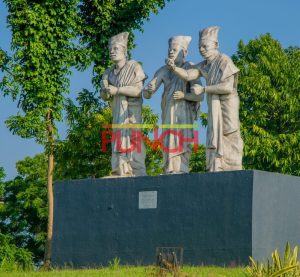 A recent proposal by Dr. D Udoh, a social media user, has sparked a renewed and contentious debate regarding the status of Lagos State as a “no man’s land.”
A recent proposal by Dr. D Udoh, a social media user, has sparked a renewed and contentious debate regarding the status of Lagos State as a “no man’s land.”
Udoh’s controversial suggestion advocates for Lagos to be adopted as Nigeria’s commercial capital, with the President appointing a minister to oversee the state, similar to the Federal Capital Territory.
Supporting his argument, Udoh emphasized Lagos’ historical significance as a former capital city and its current status as a cosmopolitan and economically vibrant hub. He proposed several measures to ensure Lagos achieves a special status, including the protection of the interests and investments of all Nigerians residing in the state. Additionally, he called for the decoupling of the state from ethno-religious politics, aiming to maintain Lagos as a melting pot for all Nigerians.
In response to Udoh’s proposal, another social media user, @de_generalnoni, expressed opposition, urging Udoh to encourage development in other states rather than stripping Lagos of its constitutionally guaranteed status. @de_generalnoni firmly asserted that Lagos is Yoruba land and will remain so.
Udoh clarified that his proposal was not intended to displace the Yoruba people, who are the original inhabitants of Lagos and should continue to consider it their ancestral home. He cited examples of other countries with multiple capitals and suggested that adopting a similar approach would not be unprecedented.
Adding to the conversation, @konibajeooo suggested replicating China’s model of economic development through the establishment of Special Economic Centres (SEZs) in economically viable states such as Anambra, Imo, Oyo, Kano, Delta, and Kaduna.
In response, Udoh reiterated the need for a restructured Nigeria, stating that his proposal aimed to designate Abuja as the political capital and Lagos as the economic capital. He pointed out that the government was already decentralizing federal offices and headquarters to Lagos and highlighted that some major oil companies in Nigeria have their headquarters located outside of their production areas.
However, not all participants in the debate supported Udoh’s proposal. Some, like @abiolapharays, dismissed it as mere land grabbing and insisted that other states should be developed instead. They argued for equal development across all states in Nigeria.
The Lagos State Government responded to the debate, emphasizing that Udoh’s proposal was a personal opinion and not a constitutional matter. The Special Adviser, Media and Publicity to Governor Babajide Sanwo-Olu, Gboyega Akosile, explained that the government’s focus was on obtaining a special status for Lagos similar to that of New York in the United States. This special status would involve greater support and resources from the central government to address the state’s unique challenges and development needs.
Dr. Ganiyu Okunu, a Lagos indigene, echoed the sentiment that Lagos should receive enhanced economic benefits and support from the federal government to fully realize its potential as the nation’s economic capital.
The debate surrounding Lagos’ status has been ongoing, particularly on social media platforms, and has sparked passionate discussions among various communities in Lagos. While some advocate for a more inclusive approach, asserting that Lagos should be open to all, others argue that Lagos remains an integral part of the South West region with its own distinct history and indigenous population.
Lagos, Nigeria’s economic and commercial capital, was officially established on May 27, 1967, through a federal decree. Following the relocation of the federal government’s seat to Abuja in 1991, Lagos ceased to be Nigeria’s political capital.
As the discussion continues, the future status of Lagos and its significance within Nigeria’s political and economic landscape remains a subject of intense debate and speculation.

